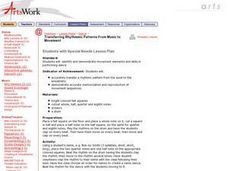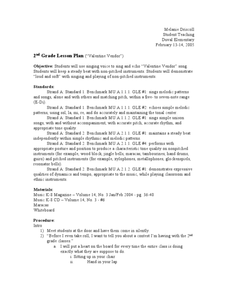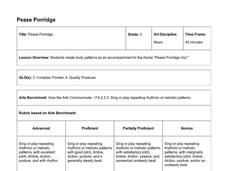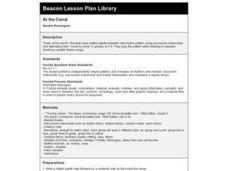Curated OER
RHYTHMIC PATTERNS
Students explore rhythmic patterns. They create and perform the rhythms and use Cubase software to perform, record, and play rhythms for use in dictation exercises. They identify and count rhythm patterns
Curated OER
Transferring Rhythmic Patterns From Music to Movement
Students identify and demonstrate movement elements in relation to musical notation. They clap to rhythms, beat on drums, match musical notes to speech patterns and use the rhythms of the their names to create a dance.
Curated OER
Jewish Folk Song: Ya Ba Bom
Singing is a wonderful way to express an idea of any kind. This lesson is written expressly for use in directing a high school chorus. They work on using four-part harmony, expression, and melodic intervals while singing a Jewish folk...
Curated OER
Rhythmic Pattern and Movement
Students practice repeating rhythmic patterns in unison. Next, students work in groups to practice an alternate rhythmic pattern to Row, Row, Row Your Boat. They create their own rhythmic patterns for the song.
Curated OER
Grade 2: Music/Valentine's Day
Play and sing a Valentine's song with your second graders. They'll follow along allow as you demonstrate how to sing and keep a steady beat on non-pitched percussive instruments. While the music lesson has a Valentine theme, that theme...
Curated OER
Learning Different Rhythmic Patterns
Fifth graders observe and demonstrate different rhythmic patterns including combinations of quarter and rest notes. They discuss how rhythm is created by using quarter and rest notes, clap to a rhythmic pattern, write a rhythm, and...
Curated OER
Learning AB Form: Music
Third grade musicians play Orff instruments while they learn about the AB Form. First they learn part A of a song, then they listen to when the song changes. After they understand the concept of AB form, they learn to play part B. Note:...
Smithsonian Institution
American Sabor Crossword
How much do you know about Latin American music? A crossword puzzle challenges learners to answer 24 questions about the history, genres, performers, and instruments of Latin American music.
Curated OER
Learning Refrain and Verse
Instruct your young musicians on the terms verse and refrain. They listen to two songs, and point out the verse and refrain as they occur. Students then play drums when they hear the verse and the refrain. Note: Song lyrics, sheet music,...
Curated OER
Rhythmic Travel Around the World
Young scholars explore and play rhythm sticks while listening to songs from around the world. They locate the countries of origin on a map, and tap their rhythm sticks to the beat of the music.
MakingMusicFun.net
It All Adds Up | Free Music Rhythm Worksheet III
In this music addition learning exercise, students add the musical notes in each equation to find the correct rhythm beats.
Curated OER
Rock Till You Drop!
Students study rhythmic patterns and phrases on percussion instruments. They form a drum circle and take turns playing the beat. After listening to styles of rhythms, students compare styles of music. They compose a short piece of...
Hawaiʻi State Department of Education
Fuzzy Wuzzy
You don't need drums to play percussion; you can use your own body. Second graders use body percussion to make four-beat rhythms and play patterned clapping games. When they are finished they discuss beats, patterns, rhythm, and rhyme.
Curated OER
You've Got Rhythm
Young scholars study the rhythm value of a half note, quarter note, whole note, and eighth note. They stamp a rhythm pattern and create a clay animation which demonstrates note value.
Hawaiʻi State Department of Education
Ostinato
Quarter notes, eighth notes, and rests; it's time to read rhythmic patterns in music. The class plays ostinatos as they practice identifying rhythmic patterns. They then listen to Mannheim Steamroller as they draw geometric patterns that...
Hawaiʻi State Department of Education
Pease Porridge
Practice using different ways to express a single pattern. The class uses concrete, pictorial, and numerical modes to represent patterns found in a simple rhyme. They will move their bodies, use body percussion, draw, and use numbers to...
Hawaiʻi State Department of Education
Beethoven’s 5th
Time to pick up an instrument and practice the first part of Beethoven's symphony No.5. Young musicians discuss melody, rhythmic pattern, dynamics, and movements found in symphonic and orchestral pieces. They then practice and play the...
Curated OER
Tumbling and Movement
Students perform basic tumbling activities. In this movement lesson, students practice tumbling and balancing moves while listening to music. Students are "frozen" into place while in certain positions.
Curated OER
AT THE CORRAL
Students study dotted eighth/sixteenth note rhythm pattern using percussion instruments and alternating from "corral to corral" in groups of 4-6. They play the pattern while listening to selected American western theme songs.
Curated OER
Wild and Wacky Warmups
Students explore vocal music techniques. In this vocal music lesson, students follow a series of warmup exercises modeled by the teacher, then participate in specific breathing and vocalizing exercises.
Curated OER
First Rhythmic Composition
Students apply fractions to counting rhythm in music. In this algebra instructional activity, students interrelate the concept of math into music as they fill out a chart identifying the names and symbols of music notes and their...
Curated OER
Reading Music Notation
Ninth graders develop an understanding of music notation and become proficient at reading rhythms by sight. They explore rhythms base on divisions of two and four and triplets.
Curated OER
Rhythm Compositions
Fourth graders collaborate in small groups to create simple rhythmic patterns in different time signatures. Each group creates rhythms in a competitive "game" atmosphere and then constructs entire rhythmic groups for presentation to...
Curated OER
Illustration # 1: Source of Illustration
Students play a game of imitating steady beats by mimicking the instructor. They use drums and repeat the game by echoing rhythmic patterns. The patterns may vary in degree of difficulty according to each individual's ability.

























